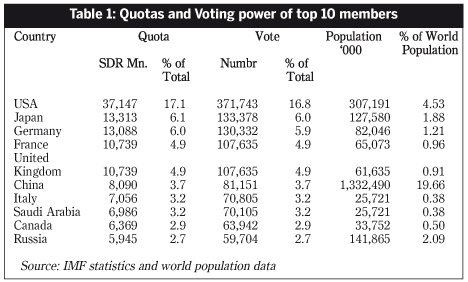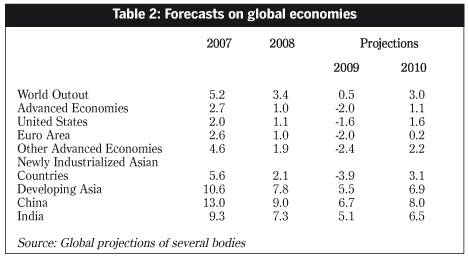The fallacy and the reality of IMF Standby Arrangement for Sri Lanka
Manoj Akmeemana - MBA(Sri J'pura),
BSc BAdm. (Special Honours) (Sri J'pura), Chartered Marketer (CIM UK),
AIB (SL), CMA (Aus.)
International Monetary Fund (IMF) has been the centre stage for
decades for its role, way of governance and policy stances which have
often aroused many debates and arguments amongst political economists,
policy makers, the member countries and even intellectuals the world
over. Even in Sri Lanka, the IMF has become a "hot" topic nowadays
especially among local politicians merely for the sake of political
advantage and not on more objective aspects such as the IMF policy
framework and importance of its financial assistance to governance.
Hence, it is imperative to understand the IMF's policy framework and
global economic outlook prior to expressing judgments or opinions and
arriving at conclusions.
IMF - birth as one of the Bratton Wood Twins
 Just
after the World War II, representatives of 45 countries agreed to have
two distinguished financial arms to face specific financial challengers
of a war-torn world. While the World Bank (WB) was established to assist
reconstruction and rehabilitation of countries, the IMF was established
to provide financial assistance to countries that experience economic
difficulties and balance of payment issues. Just
after the World War II, representatives of 45 countries agreed to have
two distinguished financial arms to face specific financial challengers
of a war-torn world. While the World Bank (WB) was established to assist
reconstruction and rehabilitation of countries, the IMF was established
to provide financial assistance to countries that experience economic
difficulties and balance of payment issues.
The funding base of IMF is deposits from member countries .The
governance of IMF is through a Board of Directors which consists of 25
directors from member countries. Today, the membership of the IMF is
represented by 186 countries.
A member quota is dependent on the relative size of a member's (i.e.
member country's) economy to the world economy. A member quota in IMF
determines the amount of its subscription, its voting weight, its access
to IMF financing and allocation of Special Drawing Rights (SDR).
However, the United States has the exclusive veto power, due to their
contribution and initiative for funding.
IMF share of criticism
IMF has its share of criticisms from its inception. Many argue that
member quotas and voting powers are not democratic and do not
representing the global realities due to the dominance of the USA and EU
in the governing body. Table 1 below illustrates the present quotas and
voting rights of the 10 top members, which also indicate the disparities
in representation of the world population.
One could argue that if the value of contribution or investment is
higher, then that person should have a comparatively higher 'say' or
vote.
Even in business, the voting rights of a quoted company are dependent
on the number of shares held by a person. However, despite these
arguments the debate is on how to change the governing structure of the
IMF to represent the new world realities.
Among the many political and economic criticisms on the IMF policy
framework, the Marxist revolutionary icon Che Guerra (1959) once said
that, "interest of the IMF represents the big international interest
that seems to be established and concentrated in Wall Street".
A former Vice-President and Chief Economist of the WB, Joseph E.
Strighty argues in his book 'Globalization and its Discontents' that "by
converting to a mere Monetarist approach, the fund (IMF) no longer had
valid purpose, as it was designed to provide funds for countries to
carry out Keynesian reflections, and the IMF was not participating in a
conspiracy, but it was reflecting the interest and ideology of the
Western Financial Community."
The fire branded leftist leaders, President of Ecuador, Rafael Correa
and Venezuelan President Hugo Chavez announced that their countries
would withdraw from the World Bank and IMF, but as to date both
countries remain as members of those institutions.
The bitter reality is today no country can isolate itself from the
world financial system and stand alone as idealistic independent
financial systems in the globe.
New Global imperatives & IMF
The sub-prime crisis in the US financial markets spread across the US
and the rest of the developed world as a major financial crisis much
like an epidemic during the 3rd quarter of 2008, starting with the
collapse of Lehman Brothers in September 2008 and spreading to several
major financial institutions - and the rest is history!
One by one, from financial institutions to industrial, retail and
consumer goods manufacturers in USA and other developed markets started
to collapse while unemployment ratios shot to the highest levels in
recent history.
 Developing
nations and emerging markets that had built their economies through
exports and imports with these developed markets were forced to face
severe repercussions. Developing
nations and emerging markets that had built their economies through
exports and imports with these developed markets were forced to face
severe repercussions.
Being strong advocates of free markets and neo-liberal economics,
these developed countries were compelled to hurriedly workout massive
bailout packages to rescue the fallen banks and industries in their
respective economies.
It's estimated that the bailout package for USA alone is a trillion
dollar budget. With these bailouts, it is quite evident that radical
changes in ownership structures of most of these companies happened
overnight with most of them being converted from private to state
ownership and being termed as "Nuclear Solutions" or "state ownerships".
The Governments of these large economies intervened by spending the tax
payers' money to rescue these fallen companies as opposed to their
popular neo-liberal idealism which they had for decades tried to force
developing nations to adopt.
With these changes and repercussions, the optimistic forecasts that
were given for several years on the future global economies were
downgraded within a matter of months!
Under this scenario, the members of the G20 summit held in London in
April 2009 agreed to boost global liquidity, an agreement that was
welcomed by the International Financial and Monetary Committee. As such
the Board of Governors of IMF had in August 2009 approved a general
allocation of SDR equivalent to US$ 250 billion to provide liquidity to
the global economic system by supplementary funding for member countries
to strengthen foreign exchange reserves. It is this action that allows
any member country to apply for a Stand-by Arrangement (STB) or Loan
from the IMF.
The Sri Lankan Economy in the global context
The Sri Lankan economy during the last two decades developed a
comparatively far greater resilience power to withstand any internal or
external shock.
The Sri Lankan economic fundamentals had been sound and showed
improvements in several fronts during the year 2008 despite the
governments determined efforts to annihilate terrorism with intensified
military operations in the back drop of many local and foreign
challenges. The following charts illustrate several aspects of the
economy of Sri Lanka for the last 8 years.
As Sri Lankans and as individuals who are not blinded with coloured
politics, one should give due credit and recognition to the respective
authorities for prudent monitory and fiscal policies that contributed to
an extent in safeguarding the Sri Lankan financial system from the
global financial crisis.
Though many have often criticized the highly regulated financial
regime of Sri Lanka, it is this very system that protected the nation
from the global financial crisis.
However, during the fourth quarter of 2008, Sri Lanka's external
sector began to experience a level of negative implications resulting
out of the global financial crisis.
Foreign investors who had to face the bitterness of the global crisis
were forced to withdraw their investment in Government securities. FDI's
and other forms of commercial funding for various projects started to
drop.
To be continued
|



